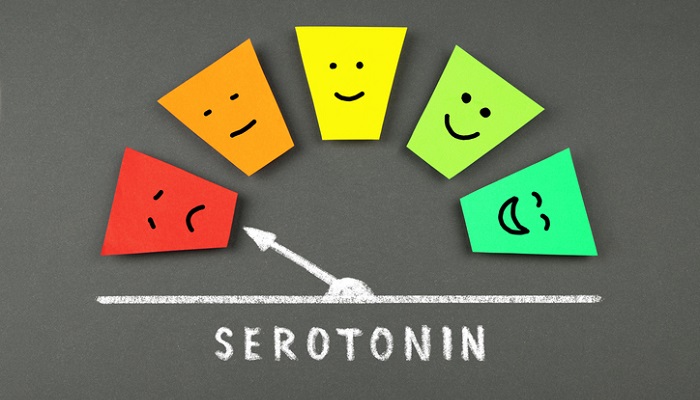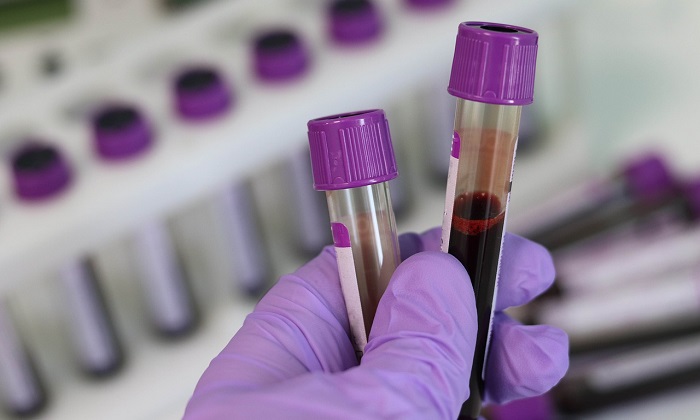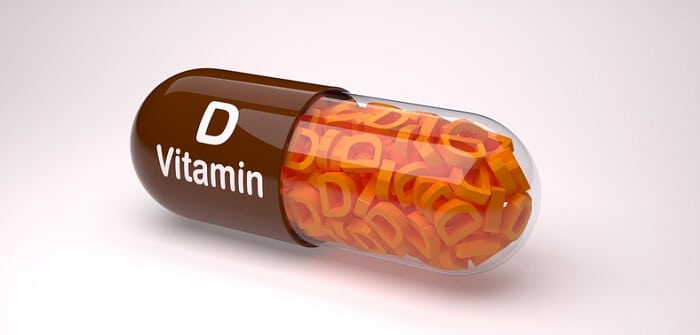Serotonin is a key neurotransmitter and hormone that performs a variety of important functions in the body. In this stressor spotlight, we’ll take a closer look at the importance of serotonin in the body and explain the causes, symptoms, and ways to balance serotonin levels.
What is serotonin?
Neurotransmitters are chemical messengers that bind to receptor nerve cells throughout the body, encouraging them to either take action or stop taking action. Serotonin is an inhibitory neurotransmitter, which means that it reduces the excitatory action of the nerve cells to which it binds.
Serotonin is found in the brain and bowels, as well as in blood platelets. The body requires tryptophan, an amino acid that the body can’t produce on its own, to produce serotonin. Depending on which enzyme it interacts with, tryptophan is converted to serotonin in either the brain or the bowel.1
About 90% of serotonin is produced in the digestive tract. This is known as peripheral serotonin. Unbalanced levels of peripheral serotonin are linked to a variety of health issues.2 Like serotonin produced in the brain, peripheral serotonin may impact mood as well.
What does serotonin do?
Serotonin is primarily known for regulating mood and memory. However, it’s involved in many other processes throughout the body:
- Mood – When you have normal levels of serotonin in your body, you tend to feel calmer and happier. Low serotonin levels are linked to depression. However, it’s not known whether serotonin levels cause depression or depression causes low serotonin levels.3
- Sexual function – High serotonin levels tend to decrease libido. SSRI antidepressants increase serotonin signaling in the brain. So while they can help with depression, they may negatively affect sexual function.4
- Bone health – Balanced serotonin levels are associated with stronger bones, while high levels can make the bones weaker. More specifically, an excess of gut-derived serotonin may inhibit bone mass regulation5
- Heart health – While elevated serotonin levels may impact the heart negatively, low serotonin levels combined with stress may promote heart issues as well.6
- Wound healing – Serotonin assists in clotting the blood when tissue damage occurs. It also works to regulate the skin’s wound-healing process.7
- Sleep – The body isn’t able to produce melatonin without an adequate supply of serotonin. This is a key reason why serotonin can impact the length and quality of sleep.8
- Digestion – Most serotonin is found in the gut. It stimulates digestion by causing intestinal contractions. A decrease in the serotonin transporter (SERT) is linked to digestion issues.9
Low serotonin: causes and symptoms

As you can see from the above list, a lack of serotonin can have a variety of negative effects on the body. Serotonin deficiency and its related problems may be caused by a variety of factors, including:
- Chronic stress
- Poor diet
- Aging
- Lack of sunlight
- Lack of exercise
- Certain medications
- Genetics10 11
Additionally, low serotonin levels are linked to other mental health issues.12
Because serotonin has a wide range of functions in the body, there are several symptoms related to deficiency. Most notably, low serotonin correlates with depression and anxiety. Another common mood-related symptom of low serotonin is irritability. Those with a deficiency of serotonin may also experience the brain-related issues of lack of memory and lack of focus. And as serotonin also affects digestion, incontinence and food-related nausea are other symptoms of this disorder. 13
High serotonin: causes and symptoms
High levels of serotonin in the nervous system can be just as damaging to the body and mind as serotonin deficiency. Certain medications may boost serotonin to unsafe levels, which can manifest in the following symptoms:
- Irritability
- Restlessness
- Headache
- Anxiety
- Tremors
- Muscle spasms
- Sweating
- Fever
- High blood pressure14
While antidepressants are the most common medications linked to high serotonin levels, over-the-counter cold medicines containing dextromethorphan, herbal supplements such as ginseng and St. John’s wort, opioid pain medications, migraine medications, and drugs like cocaine and LSD can also lead to high serotonin.15
Similar to low serotonin levels, factors like age, gender, and genetics can also contribute to high serotonin levels. It should be noted, however, that it is far more common to have low levels of serotonin than high levels, and the large majority of people who take antidepressants do not develop serotonin syndrome.16
Testing serotonin levels

Although serotonin levels can be measured with a blood test, there is not a test that can accurately measure the amount of serotonin in the brain. The general consensus, therefore, is that blood tests are not useful in detecting serotonin deficiency or excess.
Recent research, however, has found that certain types of depression can be discovered through tests. Two tests that may be able to pinpoint depression related to serotonin levels are the whole blood histamine (WBH) test, which detects undermethylation, and the kryptopyrrole test, which is a urine test that may determine if the depression is pyrrole related.17
One other test that may be useful in detecting depression related to serotonin is the plasma zinc test. Zinc is a cofactor in serotonin production. So if you have low zinc levels, you likely have low serotonin levels as well.17
Balancing serotonin levels
Balancing high serotonin could be easy as reducing the amount of serotonin-boosting medication you are taking or discontinuing any serotonin-boosting medications or supplements you are taking in addition to an antidepressant. Before you adjust your medications, however, make sure to talk to your doctor.
Serotonin deficiency, on the other hand, is often more difficult to balance. The good news is that certain lifestyle changes are capable of boosting serotonin levels. Some of the most impactful lifestyle changes that can increase serotonin production include:
Furthermore, herbs and essential oils that are used for anxiety and depression may also assist in boosting serotonin.

Some of the best herbs for anxiety and depression are lavender, bergamot, and chamomile. Supplements such as vitamin D, zinc, B-complex vitamins, St. John’s wort, tryptophan, omega-3 fatty acids, and probiotics may help balance serotonin levels as well.18
Of course, antidepressants are often used to increase serotonin . While there are various types of antidepressants including SNRI, MAOIs, and tricyclics, the most common type of antidepressants are SSRIs. These antidepressants boost serotonin by blocking the reabsorption of serotonin into the nerve cells. Because the serotonin isn’t reabsorbed, there is more of it available to pass messages between cells.
Although antidepressants are well-tolerated by some, they can cause certain side effects for others. Some common side effects of antidepressants are dizziness, loss of appetite, insomnia, low sex drive, headaches, and indigestion.
Another effective way to address depression and anxiety related to serotonin deficiency is psychotherapy. Research shows that psychotherapy can impact serotonin. For instance, one study found that serotonin transporter availability increased in the brain of depressed subjects during psychotherapy.19
Serotonin stressor Virtual Item
A digital signature representing serotonin is scanned automatically in the Balance scan and is available to scan in the Select and Elite as well. If the body’s response to this Virtual Item is out of range, or out of balance, it will show up under the Mental/Emotional Stress and Sleep categories in the Wellness Report. If included in a Select or Elite scan, it will also show up under the Neurotransmitters category.
Serotonin balancer Virtual Items
If the response to Serotonin was out of range, you can see which specific balancer Virtual Item brought it back into range on the Biomarker Progress Chart, which is included in the Advanced Report. Additionally, top services as well as balancers listed in the Mental/Emotional Stress, Sleep, and Neurotransmitter categories may also have an impact on the Serotonin Virtual Item.
Along with biocommunication scanning, ZYTO’s perception reframing technology is an additional way to effectively manage mental and emotional issues that may be impacting serotonin in the body. Speaking about issues related to depression or anxiety and going through the patented biofeedback process can help you release negative emotions and experience a healthier, more functional reality.
 About Dr. Vaughn Cook
About Dr. Vaughn Cook
Dr. Vaughn R Cook is the Founder & CEO of ZYTO. An Oriental Medical Doctor (OMD) and licensed acupuncturist, he has worked in the complementary and alternative medical field for more than 30 years, specializing in applications that integrate Western and Eastern medicine.
Sources:
1. Shad, K.F. “Introductory Chapter: Serotonin – The Most Ancient Neurotransmitter, Hormone and Trophic Factor.” in Serotonin – A Chemical Messenger Between All Types of Living Cells (London, UK: IntechOpen, 2017).
2. Stoller-Conrad, Jessica. “Microbes Help Produce Serotonin in Gut.” California Institute of Technology.
3. Bouchez, Colette. “Serotonin: 9 Questions and Answers.” WebMD LLC. Webmd.com.
4. “When an SSRI medication impacts your sex life.” The President and Fellows of Harvard College. Health.harvard.edu.
5. Gupta, A. & P. Singh. “Newly Discovered Molecules as Potential Candidates for Treating Osteoporosis.” Global Journal of Pharmacy & Pharmaceutical Sciences 7, no. 3 (2019).
6. “Combination of Stress, Low Serotonin may Promote Heart Disease.” Duke University Health System. Corporate.dukehealth.org.
7. Sadiq, A., A. Shah, M.G. Jeschke, et al. “The Role of Serotonin during Skin Healing in Post-Thermal Injury.” International Journal of Molecular Sciences 19, no. 4 (2018): 1034.
8. “The Pineal Gland and Melatonin.” Colorado State University. Vivo.colostate.edu.
9. “Irritable Bowel Syndrome (IBS) and Serotonin.” Gastrointestinal Society. Badgut.org.
10. van den Buuse, M. & M.W. Hale. “Chapter 10 – Serotonin in Stress.” in Stress: Physiology, Biochemistry, and Pathology (Amsterdam, Netherlands: Elsevier Press, 2019).
11. Young, S.N. “How to increase serotonin in the human brain without drugs.” Journal of Psychiatry & Neuroscience 32, no. 6 (2007): 394-399.
12. Lin, S.H., L.T. Lee, & Y.K. Yang. “Serotonin and Mental Disorders: A Concise Review on Molecular Neuroimaging Evidence.” Clinical Psychopharmacology and Neuroscience 12, no. 3 (2014): 196-202.
13. “Serotonin deficiency: Symptoms and treatment.” Healthline Media. Medicalnewstoday.com.
14. “Serotonin syndrome.” Mayo Foundation for Medical Education and Research. Mayoclinic.org.
15. Sahlin, Jo. “What Happens When Your Serotonin Levels Get Too High?” GoodTherapy, LLC. Goodtherapy.org.
16. Foong, A.L., T. Patel, J. Kellar, et al. “The scoop on serotonin syndrome.” Canadian Pharmacists Journal 151, no. 4 (2018): 233-239.
17. Friedman, Josh. “The 4 Most Important Lab Tests to Figure Out Why You’re Depressed.” Alternative Mental Health Solution. Moodhealing.com.
18. Alban, Deane. “Serotonin Supplements to Boost Mood Naturally.” Be Brain Fit & Blue Sage, LLC. Bebrainfit.com.
19. Lehto, S.M., T. Tolmunen, M. Joensuu, et al. “Changes in midbrain serotonin transporter availability in atypically depressed subjects after one year of psychotherapy.” Progress in Neuro-Psychopharmacology and Biological Psychiatry 32, no. 1 (2009): 229-237.